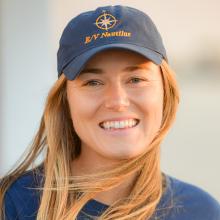
Kaila Pearson
Tell us about your work/research. What kinds of things do you do?
I research deep sea parasitic worms. Most of the worms in my study have been collected from a depth of 1000m - 3000m by an ROV (remotely operated vehicle). The polychaetes that I am researching are in the group Phyllodocidae. These annelids live in hydrothermal vent and methane seep communities and drink the blood of vestimentiferan tube worms. These dazzling, parasitic beasts are about as long as a human thumb nail, and are adorned with beautiful wispy antennae and cirri. My project aims to discern and describe new species using morphological and genomic techniques.
What sparked your initial interest in your career?
Biology and the natural world have always captivated my interest. I love observing, making connections and learning about evolutionary adaptations. I think it’s absolutely astonishing how life has adapted to live in the dark, incredibly pressurized depths of the ocean. The fact that most of the deep sea has not yet been explored sparks my interest and wonder. The abyss and benthos are like a real-life magical alternate universe with so much mystery and unknown.
Who influenced you or encouraged you the most?
The people who first encouraged me to follow my dreams are my parents. They have always supported me in everything I have done and I am so grateful. Both of my parents are also biologists at heart and never hesitated when I brought home stick bugs, pollywogs, tarantulas and lizards...actually, my mom and dad helped me catch them! Additionally, I had a wonderful high school biology teacher, Mr. Martin, who was so passionate about the curriculum that his students couldn’t help but feel enthralled. During my undergrad, I had three professors who really changed my perspective of the world and validated my trajectory. Dave Schwartz enthusiastically taught oceanography. John Carothers taught ‘animal diversity and evolution’ with incredible zeal; it is in this course that I knew I wanted to be a career biologist. The third professor who most influenced me during my undergrad is now my graduate advisor, Dr. Greg Rouse. Greg’s invertebrates course at UCSD built my understanding and interest in the terrific and complex world of our spineless friends.
What element of your work/study do you think is the most fascinating?
I find evolutionary adaptations to be one of the most fascinating and thrilling concepts in the world. It’s so incredible how animals are able to adapt methods to better thrive in their environment. For example, the worms that I am studying live in the deep sea where there is no light. Therefore they cannot see and have no need for eyes. As a result, these worms are in the evolutionary process of ridding their eyes so they can reallocate the wasted energy elsewhere. When looking at the group of worms that I research, you can see dark spots where their eyes were formerly situated. These ancestral ghost structures are called “vestigial traits” and are common among all taxa.
What other jobs led you to your current career?
All of my jobs thus far in life have been ocean-oriented. I have been an ocean lifeguard for eight years. I have worked in my family’s surfboard factory and surf shop. I have taught surf lessons. I have been a marine rescue swimmer. I have worked as an ocean science instructor aboard a 65-foot catamaran (the O'Neill Sea Odyssey) that doubled as a classroom to teach elementary school children about marine conservation. I have embarked on fisheries research cruises with NOAA. Alas, the job that most closely relates to my current graduate research, was my work in the Benthic Invertebrate Collection (BIC) at Scripps Institution of Oceanography during my undergrad at UCSD. The BIC is curated by my advisor, Dr. Greg Rouse, and managed by Charlotte Seid. The BIC works in conjunction with my lab at Scripps.
What are your degrees and certifications?
I have my Bachelor of Science in Marine Biology from UCSD, 2017.
What are your hobbies?
I love being in the ocean; surfing, stand-up paddling, swimming, free diving, etc. I also love painting and pottery and other crafts.
What advice would you give someone who wants to have a career like yours?
The best advice I can give is to follow your passion and your interests. If you want to be an ocean scientist, I would say that Jane Goodall’s mother, Vanne, gave the best guidance, “If you really want something, you will have to work very hard, take advantage of opportunity and above all, never give up.” You can’t go wrong following advice that Jane Goodall herself followed!
How did you get involved with the Ocean Exploration Trust?
My advisor, Dr. Greg Rouse offered me the wonderful opportunity to join the expedition aboard the Nautilus.
Expeditions
Kaila participated in the following Ocean Exploration Trust expeditions:
